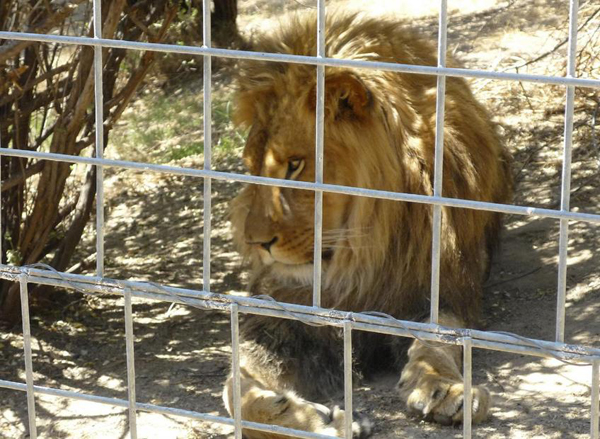Lion kills worker at California animal park
Updated: 2013-03-07 10:57
(Agencies)
|
||||||||
DUNLAP - A female intern-volunteer was killed Wednesday by a lion at a private wild animal park in Central California, and state and local authorities were trying to determine what might have caused the fatal attack.
Cat Haven founder and executive director Dale Anderson was crying as he read a one-sentence statement about the fatal mauling at the exotic animal zoo he has operated since 1993.
 |
|
This 2012 photo provided by KFSN-TV shows a 4-year-old male African lion named Couscous at Cat Haven, a private wild animal park in Dunlap, Calif. Authorities say the lion killed a female intern-volunteer on Wednesday, March 6, 2013, at Cat Haven, where the cat had been raised since it was a cub. [Photo/Agencies] |
The 26-year-old intern was attacked and killed when she entered the lion's enclosure, Anderson said, but he refused to answer questions or provide more details.
Sheriff's deputies responding to an emergency call from Cat Haven, in the Sierra Nevada foothills east of Fresno, found the woman severely injured and still lying inside the enclosure with the lion nearby, Fresno County sheriff's Lt. Bob Miller said.
Another park worker had unsuccessfully tried luring the lion away and into a separate pen. Deputies shot and killed the animal so they could reach the wounded woman, who died at the scene, Miller said.
Investigators were trying to determine why the intern was inside the enclosure and what might have provoked the attack, sheriff's Sgt. Greg Collins said. The facility is normally closed on Wednesdays, and only one other worker was there when the mauling happened, Collins said.
The male African lion, a 4-year-old male named Couscous, had been raised at Cat Haven since it was a cub, said Tanya Osegueda, a spokeswoman for Project Survival, the nonprofit that operates the animal park. Osegueda did not know how the park acquired the cub.
Cat Haven is a 100-acre (40-hectare) facility just west of Kings Canyon National Park. Since the property opened in 1993, it has housed numerous big cats, including tigers, leopards and other exotic species. It is permitted to house exotic animals by the California Department of Fish and Wildlife and is regulated as a zoo by the US Department of Agriculture.
Results of the last 13 inspections by the Department of Agriculture's Animal and Plant Health Inspection Service show no violations dating back to March 2010. The most recent inspection was February 4, USDA records show.
Despite state regulations that require annual inspections, the California Department of Fish and Wildlife most recently inspected the facility in January 2011.
The inspector's written comments were "facility in good condition". The inspector checked gates, enclosures, water supplies, drainage, cleanliness, ventilation and the general health of the animals.
Department spokeswoman Janice Mackey said she was unaware if any state regulations would prohibit an employee from entering an exotic animal's enclosure.
She said each species is identified on the permit, and the animals must be used for scientific or educational purposes only.
Nicole Paquette, vice-president of the Human Society of the United States, voiced concerns.
"She should have never been in the enclosure with him," Paquette said of the victim. "These are big cats that are extremely dangerous, and they placed a volunteer in the actual cage with a wild animal. That should have never happened."
Officials at another big cat sanctuary, Big Cat Rescue in Tampa, Florida, told The Associated Press last year that at least 21 people, including five children, have been killed and 246 mauled by exotic cats in the US since 1990. Over that period, 254 cats escaped and 143 were killed.
Tatiana, a tiger at the San Francisco Zoo, was killed by police after jumping out of its enclosure and fatally mauling a 17-year-old boy and injuring two other people in 2007.
Cat Haven has housed Bengal tigers, Siberian lynx, caracals, jaguars and leopards of various types as well as bobcats native to the area. Anderson described the private zoo several years ago as one of a handful of facilities across the US that has all of the big cat species in one place.
The facility's website says it promotes conservation and preservation of wild cats in their native habitats and offers visitors tours and educational outreach.
Anderson said Project Survival would investigate to see if the intern and the other worker who was on-site followed the group's protocols.
"We take every precaution to ensure the safety of our staff, animals and guests," he said in a written statement.

 Li Na on Time cover, makes influential 100 list
Li Na on Time cover, makes influential 100 list
 FBI releases photos of 2 Boston bombings suspects
FBI releases photos of 2 Boston bombings suspects
 World's wackiest hairstyles
World's wackiest hairstyles
 Sandstorms strike Northwest China
Sandstorms strike Northwest China
 Never-seen photos of Madonna on display
Never-seen photos of Madonna on display
 H7N9 outbreak linked to waterfowl migration
H7N9 outbreak linked to waterfowl migration
 Dozens feared dead in Texas plant blast
Dozens feared dead in Texas plant blast
 Venezuelan court rules out manual votes counting
Venezuelan court rules out manual votes counting
Most Viewed
Editor's Picks

|

|

|

|

|

|
Today's Top News
Live report: 7.0-magnitude quake hits Sichuan, heavy casualties feared
Boston suspect cornered on boat
Cross-talk artist helps to spread the word
'Green' awareness levels drop in Beijing
Palace Museum spruces up
First couple on Time's list of most influential
H7N9 flu transmission studied
Trading channels 'need to broaden'
US Weekly

|

|







